For the past decade, social media has been a tool for women’s fashion brands to connect with consumers. Influencers have become a critical and necessary part of beauty and fashion marketing strategies. As retail has shifted to ecommerce, fashion brands have ample opportunities to drive conversions across all social media.
But this also means that fashion is one of the most competitive markets, and brands must be strategic in how they work with influencers to stand out, relate, and stay relevant. In this guide, you will learn how women’s fashion brands can use fashion and lifestyle influencers to grow and scale in a measurable way, effectively remaining competitive in this market of opportunity.
What is fashion influencer marketing?
Influencer marketing in the fashion industry: when fashion brands work with influence creators to connect with their target audience.
Since 2007, fashion influencer marketing has made a huge impact. A major shift from traditional fashion advertising and marketing, bloggers give fashion brands more human authenticity and relevance to stay on the pulse of trends. The rise of social media allows bloggers and influencers to build impressive numbers of followers, who make buying decisions based on creator posts like OOTDs (outfits of the day). Consumers often follow fashion influencers who have similar physical characteristics as themselves, which provide a more reflective example of how fashion articles will look when they themselves wear them.
With the rise in both content consumption and ecommerce, the global fashion influencer marketing market size is expected to reach $17.12 billion by 2027. Whether you’re promoting a new clothing line, rebranding, or raising awareness for a sale, it’s more critical than ever to start building influencer marketing campaigns that grow your business.
Through visual and interactive posts that drive a fresh narrative, women’s fashion influencers reach niche audiences to spread brand awareness, build brand identity, and model the real look and feel of clothing and accessories.
Challenges of influencer marketing
Most brands that do independent influencer outreach have problems finding and filtering over 60 million influencers for their best fit. It’s also common for brands to lose campaign focus without the right tools to manage fashion social media content across many different creators and social platforms.
By relying exclusively on in-house influencer marketing, you risk:
Working with influencers inconsistent with your brand
Losing track of influencer outreach and communication
Missing the metrics you need to prove marketing spend and ROI
Signing influencers with misleading followings
Creating flawed influencer contracts and proposals
Issues with program tracking and influencer payments
Failing to meet your campaign goals
8 things the fashion consumer wants from brands (and how influencers can help)
Fashion consumers explore social media daily, looking for more than popular brands; they seek entertainment, inspiration, and lifestyle enrichment that resonates with their personal self-expression. Limited in time and challenged by unmanageable choices, they rely on their favourite influencers to become their personal shopping filters to help them identify their next finds.
In our decade-long relationship with influencers, we’ve found that women’s fashion consumers look for brands and creators that:
1
Are original, yet stay on trend
Consumers expect a lot from fashion brands: a balance between being original and innovative with products while staying on the pulse of the latest influencer trends. For example, brands that miss important trends like athleisure and fitness wear are missing out. Fitness wear is consistently a top category for sales conversions and searches, seeing a 177 percent YoY increase in the LTK app. Creators that are on trend can keep your brand perception on-trend.
2
Provide an easy path to purchase
Women’s fashion consumers value convenience when they shop. As they scroll social media and discover outfit inspiration from influencers, they may be ready to purchase within minutes. That’s why brands need to simplify the user experience from social to purchase. By working with LTK influencers, for example, you give consumers easy and shoppable content not available anywhere else. From the social post, they can easily tap and follow the product straight to the LTK app or your site to make purchases.
3
Embrace all body types
More and more, brands are recognizing the need to represent all body types. Size inclusivity builds your reach. With millions of fashion content creators on social media, brands have the ability to appeal to buyers of all builds, looking for items that look good on people like them.
4
Promote diversity and inclusion
Consumers seek inclusive brands they can relate to on a personal level, who truly represent them and their view on the world. Successful brands work with diverse influencers to champion inclusion and diversity across creative product content.
5
Offer timeless and seasonless style
Brands that embrace seasonless style and “break the rules'' are meeting the needs of today’s fashion buyers. Modern consumers, especially Gen Z, are recyclers in almost every aspect of their lives. Despite the microtrends, they look for brands and influencer trends that support sustainability and offer durable closet staples/essentials that can last them through the years. Think: little black dress, the plain white t-shirt, the clunky sneaker, or the classic leather jacket. While fulfilling this trend, brands can also realise longer shelf life for the content propagated by influencers. Not all influencer views happen during a small promotional window. It is not uncommon for consumers during their discovery stage of a specific content creator to review their past posts to get to better understand their style and unlock new hidden fashion gems.
6
Evolve with them
People change, and they want their brands to do the same. Women’s fashion and lifestyle influencers bridge the gap between you and consumers by offering fresh content that continues to appeal to followers even as they evolve from one style or trend to another. Creators not only help drive sales today, but if you listen to their feedback, they can help you better plan for the future.
7
Are sustainable and transparent
There’s a rising movement for fashion to be more eco-friendly and ethical. The buyer is more aware of what goes into manufacturing and shipping a product than ever before. When consumers have the right information, they’ll reward those brands that are doing the right thing. Influencers know how to tell your story in a personal way that gives buyers confidence they’re making a smart, ethical decision.
8
Live online and in-store
Women are buying fashion online more than ever. But even with the continuous rise of ecommerce, fashion consumers still want to visit brick-and-mortar businesses to try on clothes and see the quality themselves. Influencers bring value to in-store marketing strategies with try-ons and live streaming of grand openings. Brands that were once primarily online have now opened storefronts for an omni-channel consumer experience.
As your brand answers the call on these modern expectations, a diverse mix of fashion influencers raises the awareness around that, putting your brand ahead of others.
What is a fashion influencer?
A women’s fashion influencer is a person with a following on social media who creates fashion content and has the power to influence your consumer’s opinion and purchase decisions.
But many fashion influencers are lifestyle influencers. As consumers look to influencers for advice in every part of life, creators are shifting away from the traditional one-niche approach. Now, they talk about what they’re reading, their skincare routine, and their workout regimes. As a result, your brand can be authentically promoted as a part of the influencer’s lifestyle and build deeper consumer trust in your brand.
As consumers look for new styles to add to their wardrobe, they’re searching a full lifestyle landscape of their favourite influencers, who have become the top-ranked influential resource for what to do and buy. Now is the time to tap into this broader territory and see what data comes back. By leveraging an influencer network platform and expert in creator management, brands can confidently execute a successful influencer marketing strategy based on unmatched influencer data in the fashion sector.
Women’s fashion influencers are:
Experts in their followers’ preferences & purchase behaviours
Trusted for their recommendations through authentic content
Constantly on the pulse of new trends and how to execute them
Able to tap into brand-relevant niches for specific campaigns
The most agile, cost-effective, and trackable sales channel
Excellent digital content creators and brand collaborators that are more influential than paid advertising according to LTK’s national shopper study
Characteristics of women’s fashion influencer content
Fashion influencer marketing can help you cut through the facade of unrealistic polished content. Their viewers connect with their authenticity, liking and sharing much more than overly produced content.
Instead of getting that “perfect shot,” it’s common for influencers to post semi-spontaneous content, like getting ready in the morning or out at brunch on a regular day. Unlike traditional marketing content, influencer content is more relatable, attainable, and fun.
Fashion creators, in particular, have built their influencer marketing hub business on their own personal styling. When working with influencers, you’re not going to get the same carbon copy images because influencers are all shooting with different backgrounds and locations — all with their own take on how to style your clothes and accessories.
This content allows the influencer to really show their audiences how to style a particular trend and offer inspiration that is most relatable to them.
Whether you’re a luxury brand or streetwear, influencers can help you scale, drive brand awareness, and increase sales.
Fashion-focused influencer content includes:
Spontaneous video posts
Live stories and streams
Interactive Instagram polls
TikTok try-ons
Reels with trending music
OOTD (outfit of the day)
Lookbooks
What matters to fashion and lifestyle creators
Influencers create content according to their personal brand, which attracts a specific audience with certain values. These values impact the types of brands influencers work with, whether it’s company culture, materials the clothing is made of, or the brand aesthetics.
The most common characteristics creators look for before signing a contract include:
Brands that align with their personal ethos
Most influencers want to partner with a brand that they would organically recommend to their audience. This keeps their personal brand consistent and their following intact. Working with an expert in influencer management helps you sift through the sea of influencers for best-fit casting from the start.
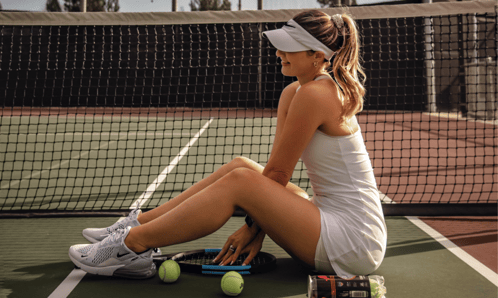

A good collaboration partner
Influencers value communication. Build a healthy and collaborative brand-influencer relationship by communicating early and often. Be clear about what you need, allow creative freedom, and provide plenty of notice on projects.
LTK utilises industry-leading influencer marketing software to facilitate communication between brands and influencers, keeping campaigns on track.
Stock level updates
Influencers look out for their followers. If an item is out of stock, their followers won’t be able to purchase the exact items they promote – and it reflects on them too. Promoted items need to be available or communication needs to go out when stock is low.
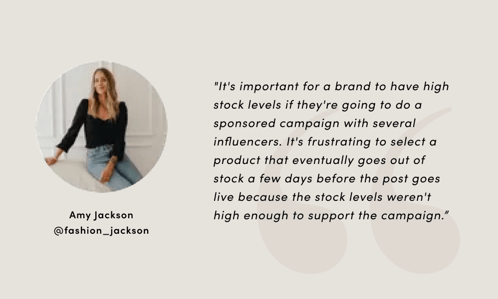
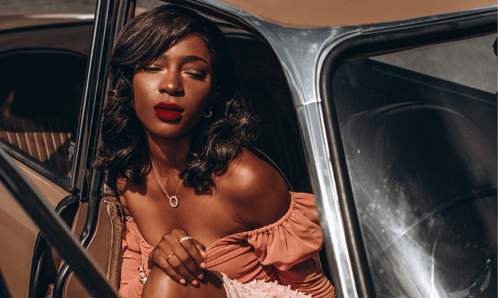
Creative freedom on content
Influencers are content creators, first and foremost. Trust the relationship they have with their audience and allow them to create content that will come across authentic regarding your brand. Providing a defined idea of what you want from the partnership while avoiding being prescriptive will produce results.
Inspiration
A mood board, along with any helpful messaging, can inspire the influencer to bring the content to life in a way that represents your brand identity.
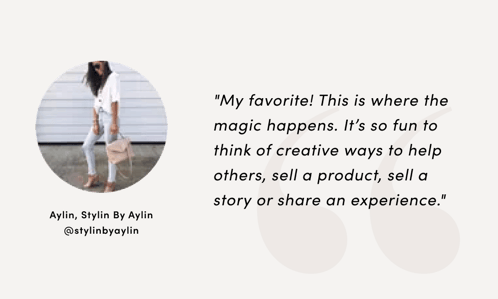
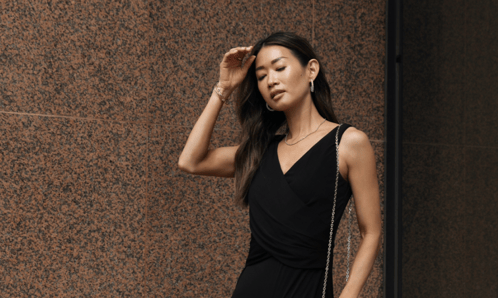
Brands that stand for diversity and inclusion
Influencers are in tune with their diverse audiences who want to support brands that champion inclusion. Thus, influencers are looking to work with brands that operate by high moral and ethical standards, and who prioritise diversity and inclusion in their business, messaging, and their visual content. It is important to work with a mix of creators from diverse backgrounds in order to connect and truly relate to the world we live in.
A clear and organised contract process
Your contract is the start of your influencer-brand partnership. Provide talking points, brand information, and helpful tips for deliverables. An expert enabled by the most advanced influencer marketing management platform and software can help you create a thorough influencer proposal template — keeping everything and everyone fully aligned.
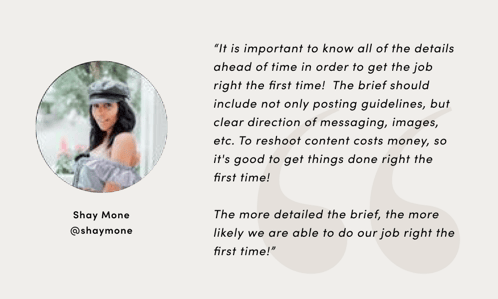
Casting the right women’s fashion influencers
Curating influencers simplifies and amplifies influencer selection and creation. But what has differentiated LTK to become the #1 influencer platform in the world based on attributable sales, is creator curation selectiveness and identifying influencers with the greatest propensity to drive sales and engagement.
Working with LTK’s proprietary influencer relationship management software and an influencer analytics platform further enhances effectiveness. As you’re navigating how to find fashion influencers for your marketing campaigns, keep these tips in mind.
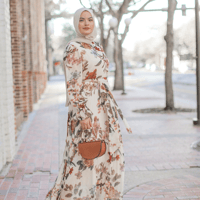
Micro fashion influencers drive significant engagement
The micro-influencer is someone who has between 1,000 to 100,000 followers. According to fashion professionals worldwide, micro-influencers are considered to be one of the leading tiers of influencers according to Statista.
Traditionally, women’s fashion brands have relied on follower count as a key guiding metric when choosing influencers. But smaller influencers can drive better attention, engagement, and sales for specific audiences.
While a mega influencer with 1M+ followers may have low engagement and few conversions, a nano influencer with 10,000 or fewer followers may have higher engagement for their niche, and stronger influence for conversion.
Micro-influencers offer a direct connection to Gen Z, which is the generation with the most shopping influence on the general population and has $143 billion in spending power in just the USA according to McKinsey Research. The micro-influencer reaches Gen Z as the modern-day “best friend.” Whether it’s a TikTok try-on haul or an Instagram live review, micro-influencers deepen trust in the path from product post to purchase.
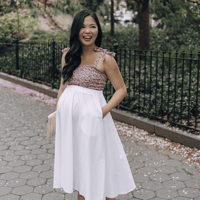
Determine influencer pay with data
Influencer pay has been notoriously hard for brands to determine. Do they base value on impressions, engagement, followers, or other metrics?
Now, with increased visibility into audience worth and a deeper understanding of metrics and attribution through advanced sales and audience reporting from LTK’s influencer software, there’s no more guesswork in casting creators.
Gain the highest level of influencer transparency by working with an influencer marketing management platform and expert with influencer intelligence. LTK brands have access to resources that measure and sharpen campaign performance.
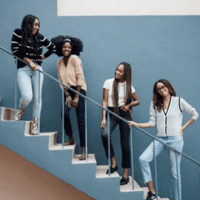
Choose influencers who value video
Video is the dominant content format. Whether it’s reels, TikTok, or LTK Shopping Video, consumers seek video content on every platform, for every purpose. More than static photos of products, videos serve as educational content that shows how a piece really looks, feels, and moves in real life.
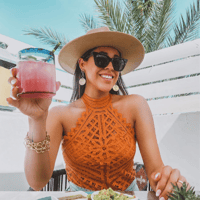
Look for creators who inspire user-generated content
Work with influencers whose followers repost, share, and tag content. This social proof creates a steady flow of organic women’s fashion content that solidifies confidence in your brand.
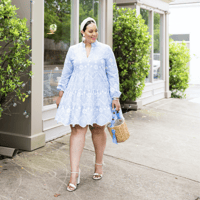
Diversify your content channels
As content channels constantly shift in popularity, fashion brands must work with different types of influencers who live on various platforms and use a variety of content formats.
Influencer marketing and creator content is not a “one-size fits all” strategy. Effective posts and content formats come down to that particular influencer and which platforms and type of content engages their audience the most. Utilise an influencer marketing hub with influencer data to determine which channel mix will benefit each campaign.
Is influencer marketing right for your brand?
Retail brands of all sizes and budgets can benefit from influencer marketing.
Nearly 89% of consumers worldwide read reviews before buying products according to Trustpilot. And influencers have situated themselves as “professional reviewers” to their cultivated following. Influencers who specialise in certain styles and niches can be a valuable addition to reach a specific target audience.
Growing boutique fashion brands
For smaller or boutique women’s fashion brands, influencer marketing increases brand presence on social media. By activating an influencer marketing campaign, smaller brands can reach new audiences and increase sales/traffic to their site.
Don’t have the budget for a full influencer campaign? LTK offers other placements at lower flat fees to help spread brand awareness.
Testing different influencer channels and verticals is key to learning how to reach and grow your audience. Influencer marketing builds a bridge from your boutique brand to a larger audience — and makes the path to purchasing your clothes (and tracking those purchase trends) much easier.
Scaling larger fashion brands
Larger fashion brands can scale by expanding influencer campaigns for increased reach and revenue. Through influencer marketing management, large brands build and maintain relationships with content creators and identify effective brand ambassadors to increase awareness and sales.
Larger fashion brands work with us to develop a layered, full-funnel approach to scale their influencer marketing programme.
LTK Recognises the Brands Leading Creator Commerce™
Brand nominees were selected based on their unique and impactful creator strategy and LTK proprietary benchmark data - measuring content reach and engagement, awareness, and sales.
Pro tips for your influencer marketing campaign
Keep these in mind as you develop your influencer marketing campaigns.
-
Budget according to your campaign goals
Plan a budget that will allow your campaign to meet your goals. Stretching a small budget across too many goals will not be impactful or yield a successful campaign. If your campaign has various goals, such as increased traffic to site, content creation, and branding, make sure your budget is enough to secure influencers geared to each goal.
LTK guides women’s fashion brands towards the best strategy. Depending on the budget and campaign objectives, we may recommend a more layered approach, like running separate campaigns to achieve each goal.
-
Make casting decisions based on influencer data
To make sales, you need to gather historical data and track performance. By working with partners like LTK, brands make strategic and informed influencer casting decisions that will help deliver on campaign goals.
-
Be honest about your expectations up front
While you want to allow the influencers creative freedom, it’s critical to set expectations up front and be explicit about anything your brand does and does not want included in content. This keeps the relationship safe and everyone on-brand.
-
Grow influence
When managing your influencer marketing campaign, return on ad spend and results don’t always happen instantly. Influence and reputation, just like with other marketing media, is built over time with fashion influencers.
The LTK team goes above and beyond to identify progress and areas for improvement to reach optimal performance. The LTK Score™, provides insights into how your brand’s influence ranks and best opportunities to GROW (Gather, Reach, Optimize and Win!) your influence.
Determining goals and budget
Conduct influencer research and casting
Determine target deliverables
Write and facilitate contracts
Negotiate influencer rates
Ensure contract fulfilment
Monitor budget and prove ROI
At LTK, we help you and all of your departments, Brand Marketing, PR, Digital, Affiliate, In-Store, and Product Development, every step of the way and amplify your creator-powered marketing efforts. As an influencer marketing platform designed for creator management, we help you do it all in-house, so you have the influencer intelligence to run effective influencer marketing campaigns without completely outsourcing to an agency.
Today’s fashion brands need an influencer marketing partner who can:
1 — Find and scale influencer relationships
With LTK’s network of hundreds of thousands of global lifestyle creators, you can make connections with brand-aligned, revenue-producing influencers you would not have found independently.
2 — Help set realistic outcomes
LTK sets expectations for both parties upfront. We streamline key campaign information like brand goals, objectives, imagery and messaging considerations, key dates, deliverables, and other campaign details.
3 — Manage and facilitate ongoing influencer partnerships
With an easy-to-use messaging hub, avoid tedious social outreach for easier day-to-day collaboration and relationship management from start to finish.
4 — Keep everyone informed
Throughout the campaign process, your influencer management partner should keep both parties informed on the campaign status. This helps the brand and influencers stay on track in order to meet the established goals.
Start your influencer marketing campaign
If you’re new to influencer marketing and aren’t sure where to start for your fashion brand, you’re not alone. Discuss your challenges and objectives with LTK to start down a path guided by performance data to build a strong strategic foundation to GROW from. As the leading influencer marketing hub for over 10 years, LTK has solved influencer marketing challenges through:
- Amplified distribution through the largest creator shopping channel: shopLTK.com with 8M+ shoppers
- Full-service creator programmes that deliver on your unique objectives
- Strategic planning based on historical brand performance data
- Expert brand consulting, planning, executing, and reporting
- End-to-end campaign execution and influencer casting
- Access to the most successful influencer platform in the world
- Licensed imagery from premium creators for your own marketing channels
- Conference and event integration to build long-term relationships
- Access to real-time measurable results on the top influencer campaign management software
Use your test campaign as an opportunity to discover best-match fashion influencers who convert. As you think longer-term strategy down the road, our influencer marketing platform will help you secure those influencers as your ambassadors.












